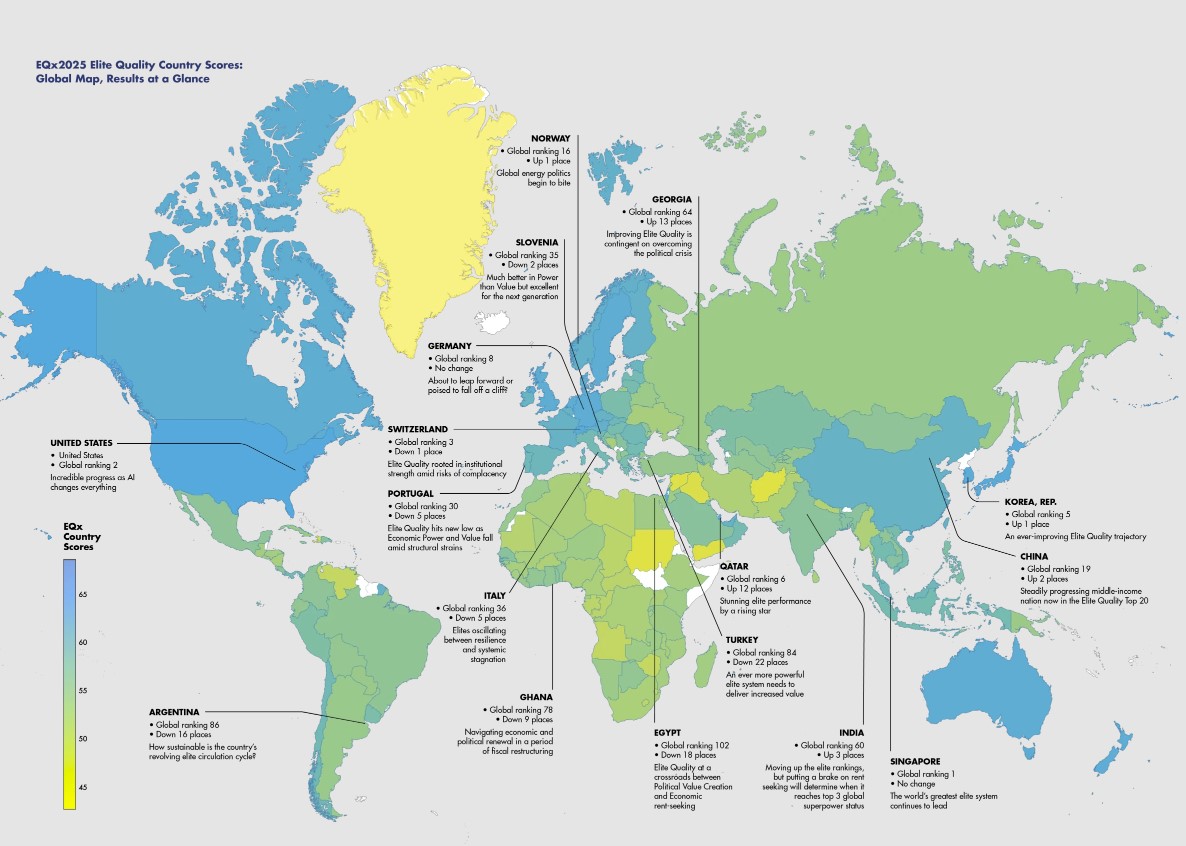
The Elite Quality Index (EQx) returns in 2025 with its sixth edition, with the academic leadership at the University of St. Gallen (HSG) and done in collaboration with Singapore Management University’s (SMU), international academic partners, and the St. Gallen Foundation for Value Creation.
The EQx ranks 151 countries across 149 indicators, including innovation, corruption control, regulatory quality, and, new this year, artificial intelligence (AI) readiness. It measures complex concepts such as Power and Value, ultimately assessing whether national elites are creating value for society or extracting it from the public
Singapore retains its position at the top of the 2025 Elite Quality Index, a reflection of the enduring effectiveness of its technocratic governance and institutional design. Singapore’s elites have long demonstrated an ability to align private enterprise with public interest, underpinned by high scores in corruption control, regulatory quality, and adaptability. Yet, while Singapore’s model remains efficient and broadly inclusive, its future resilience is less assured. As global trade fragments and supply chains realign, the challenge will be whether such tightly managed value creation can remain sustainable in a world tilting toward deglobalisation and strategic decoupling.
According to Associate Professor Alwyn Lim at Singapore Management University, “Singapore’s elites have consistently created value for society rather than extracting it, but our dependence on global integration poses challenges as deglobalisation accelerates. The capacity to sustain elite-driven value creation in an age of decoupling will be key.”
Elite quality matters: High-quality elites expand the economic pie for everyone, while low-quality elites increase their own share at the expense of others. The EQx measures the quality of a country’s elite business models by assessing how much value they create for society relative to the power they hold. For example, in Singapore, elites have significant power and influence over the government and key industries but they create high value through innovation, education, and governance.
The EQx is grounded in the elite theory of economic development, where elites are defined as the dominant business models within a nation’s political economy. These include actors such as large corporations, financial institutions, labor unions, and civil servants. The elite theory of economic development acknowledges that powerful individuals or groups like business leaders, politicians, or cultural influencers, rather than broad societal or institutional factors alone, are critical in shaping economic outcomes.
EQx2025 Highlights:
AI Is Changing the Global Game, and Asia Is at the Forefront
China continues to climb, reaching #19—an extraordinary result for a middle-income country—thanks in part to its rapid advancement in AI. India also shows strong upward momentum, moving up 3 spots to #60, a substantial improvement from its #118 ranking in 2021. Japan maintains its stronghold at #4, while Korea’s unstoppable ascend puts it at #5.
U.S. Skyrockets to #2 — AI Shakes the Global Order
Singapore retains its position at #1 in the EQx2025. However, the big story this year is the United States, which leaps from #16 to #2 overall, overtaking Switzerland, now in third place. This dramatic rise is largely attributed to the introduction of five new AI-focused indicators among the total 149—highlighting how artificial intelligence is now central to elite-driven value creation.
But Asia is rising fast: Japan (#4), South Korea (#5), and China (#19) are all demonstrating how tech-savvy elites can drive inclusive growth. India has also improved dramatically, jumping to #60 from #118 in just four years.
Singapore ranks near the top in AI readiness, but sustainability of value creation across generations is a concern — it ranks only 23rd in this area, compared to Nordic nations like Denmark or Switzerland.
The EQx2025 paints a dynamic picture of Asia’s future. While Singapore remains a benchmark in elite quality, the ascent of China, India, Japan and South Korea signals that the region is fast becoming a key architect of the next economic order. For emerging economies such as Indonesia, Vietnam, and the Philippines, the report suggests a growing role in shaping inclusive, tech-enabled growth.
“Singapore’s model, rooted in technocratic competence, openness to global markets, and a high degree of institutional trust, continues to set the regional benchmark. But its success is deeply intertwined with globalisation, which is now under strain. As AI reshapes value creation and geopolitical fragmentation deepens, Singapore’s challenge will be to sustain elite-led innovation in a world tilting towards deglobalisation. The durability of this model will be a critical test in the coming years, not just for Singapore, but for other export-dependent economies,” Prof Lim noted.
What This Means for Asia
The EQx2025 suggests that Asian economies are no longer just “emerging”, they’re shaping the rules of future value creation, especially through technology and innovation. But sustaining this progress requires more than growth, it demands fairness, future planning, and shared prosperity.
Emerging economies like Indonesia, the Philippines, and Vietnam are not yet top-ranked but are increasingly important to regional stability and economic systems.
For Policymakers, Educators, and Business Leaders
The new interactive EQx2025 platform allows users to compare countries, explore data, and understand how elite-driven systems affect economic and social outcomes. For C-suite leaders, investors, and strategists, the index provides valuable intelligence on which countries are likely to deliver resilient, sustainable growth—and which may falter under short-termism or weak institutions.
An academic version of the paper can be found at papers.ssrn.com, the full hard cover version is published by Anthem Press. More information also at elitequality.org.
